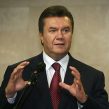
Presidential Election Campaign Paralyzes Ukrainian Parliament
Publication: Eurasia Daily Monitor Volume: 6 Issue: 169
By:

Ukrainian lawmaking has fallen victim to the presidential election campaign. Parliament has failed to resume its work after the summer vacation as the opposition Party of Regions (PRU) physically blocks the rostrum making it impossible to vote. The party is protesting against the refusal by the pro-government majority to increase minimum wages and pensions. It is likely that the present crisis will persist for some time to come. The two main players, the PRU and the Bloc of Prime Minister Yulia Tymoshenko (BYT) are apparently both satisfied with the status quo. PRU leader Viktor Yanukovych has attempted to win the hearts and minds of voters by his populist demands, while Tymoshenko hoped that the uncivilized behavior of her main opponents might increase her own chances for victory in the January 2010 presidential poll.
On September 1, at its first sitting after the vacation, parliament rejected the PRU’s proposal to increase the minimum wage. The bill was backed by 200 votes, 26 short of the required number. The PRU reacted by blocking the rostrum, saying that it was determined to continue the blockade until the majority agreed to more than double minimum monthly wages to the equivalent of $190 and raise pensions by a similar amount (Ukrainska Pravda, September 1). Yanukovych signaled that he would not stop short of organizing street protests to increase wages and pensions (UT1 TV, September 11). Yanukovych claims that there are enough funds in the state coffers for the increase, and that Tymoshenko only wants to use the issue in her election campaign (Inter TV, September 6).
Tymoshenko’s team argues that the PRU’s demands are purely populist and that inflation would spiral if they were met. "We flatly object to an insufficiently motivated increase of social standards [which would] only add 10 hryvnias ($1.1) to pensions and later 100 hryvnias will be lost because of inflation and devaluation," said BYT caucus leader Ivan Kyrylenko (Channel 5, August 31). If the BYT agreed to the increase, the state finances would be unbalanced and relations with the International Monetary Fund (IMF) would be seriously damaged. Tymoshenko promised the IMF to keep the budget deficit under 6 percent in 2009 and under 4 percent in 2010. This was among the conditions for the IMF’s $16.4 billion loan -Ukraine has already received three tranches totaling over $10 billion.
It is an open secret that the PRU is attempting to fool its potential voters. One Ukrainian weekly noted that PRU members are not interested in increasing pensions and wages, as most of them are businessmen who are not ready to pay their employees more (Zerkalo Nedeli, September 12). However, by advocating this policy the PRU is not risking anything, understanding that its demands will not be met by Tymoshenko because of the economic crisis. The BYT is not willing to accept the PRU’s conditions not only due to the economic situation, but also since Tymoshenko apparently believes that the blockade of parliament works against her main rival in the election campaign. According to her team’s findings, Yanukovych is losing potential voters because of the blockade, while Tymoshenko may use the blockade to her advantage by claiming that the PRU actually makes the approval of higher social standards impossible by disrupting the legislative process (Segodnya, September 15).
The blockade of parliament makes impossible both the appointment of the new ministers of finance, foreign affairs, defense and transportation (several of these positions have been vacant since as early as February) and the timely adoption of the state budget for 2010. However, election campaign considerations apparently come first for both the PRU and BYT, and neither of the two parties is interested in resuming the normal work of parliament.
It is unclear what can be done practically to reboot parliament. According to the constitution, President Viktor Yushchenko has lost the right to disband it and call snap elections six months before the January 17 presidential poll. He suggested instead that parliament should disband itself, and blamed Tymoshenko and Yanukovych for the current impasse. "The intrigues of two political forces are behind this. These are essentially intrigues by two individuals," he said (Ukrainska Pravda, September 2).
Tymoshenko’s party indirectly confirmed that it is happy with the status quo by suggesting that parliament should not gather until after the election, and that deputies should work in their constituencies instead (Ukrainski Novyny, September 9). Parliamentary Speaker Volodymyr Lytvyn, an ally of Tymoshenko’s, grudgingly accepted this proposal and blamed the PRU for the situation.
Many PRU senior members apparently want the dissolution of parliament, in particular unofficial party spokeswoman Hanna Herman and the Shadow Finance Minister Mykola Azarov, who holds pro-government deputies responsible of rubber stamping laws to fit Tymoshenko’s election promises (Channel 5, September 2). However, Yanukovych spoke vehemently against parliament’s dissolution in one of his most recent television appearances (Inter TV, September 6). It appears that parliament will be unblocked only if either Yanukovych or Tymoshenko, or both, find that the stalemate spoils their chances in the presidential election campaign.




